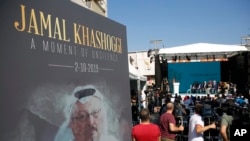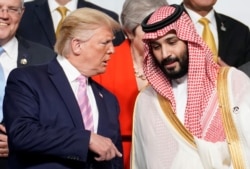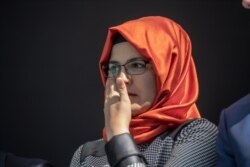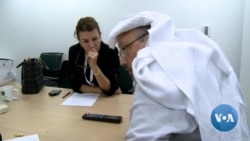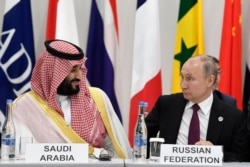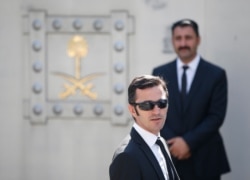Asli Pelit from VOA's Turkish Service contributed to this report.
The killing of prominent Saudi dissident and Washington Post columnist Jamal Khashoggi shook the world one year ago, when the public learned how a Saudi government team assassinated and dismembered him inside the Saudi consulate in Istanbul, Turkey.
Khashoggi had criticized Saudi Arabia's leaders for their repeated violations of human rights, persecution of critics and aggressive regional policies, including their role in Yemen's four-year-long civil war.
The CIA concluded, according to published reports, that Khashoggi's murder was ordered by Saudi Arabia’s Crown Prince, which led U.S. lawmakers to publicly condemn the country and try to halt U.S. weapon sales to the kingdom.
U.S. President Donald Trump defied members of his party to push through an $8.1 billion weapons sale, maintaining friendly relations with the kingdom which he cites as a bulwark against Iran’s influence. Trump insisted the U.S. couldn't afford to give up huge arms sales to its Middle East ally.
"We may never know all the facts surrounding the murder of Mr. Jamal Khashoggi," Trump said in November 2018. "As President of the United States I intend to ensure that, in a very dangerous world, America is pursuing its national interests and vigorously contesting countries that wish to do us harm. Very simply it is called America First!"
Khashoggi’s fiancée says many countries including the United States failed to do the right thing and hold Saudis leaders responsible.
“Controlling (vast) energy sources shouldn’t be enough to get away with murder,” Khashoggi's fiancee, Turkish author Hatice Cengiz, said in an interview with VOA.
The verdict in Cengiz’s mind was clear. Perhaps under different circumstances, absent “huge oil and arms deals” between the U.S. and Saudi Arabia, Khashoggi’s case would not be so easily dismissed at the highest level.
Instead, she was left to watch a Saudi court try to demonstrate that it is holding people accountable.
Eleven Saudi suspects would eventually stand trial in a Saudi Arabia courtroom. Five of them face the death penalty in the ongoing case, if convicted. But their roles in Khashoggi's murder remain unclear to the public.
No matter the outcome, a United Nations human rights expert says the trial has amounted to nothing more than a sham — held behind closed doors and protected from independent scrutiny — thus failing to meet international standards for an investigation conducted “in good faith.”
‘A slap in the face’
Following a six-month investigation, U.N. Special Rapporteur Agnes Callamard determined that Saudi Arabia was responsible for “premeditated execution” in the Oct. 2, 2018, death of Jamal Khashoggi.
Her report, released June 19, 2019, recalled gruesome details as assessed by Turkish Intelligence and other countries. These included the possible injection of a sedative, suffocation using a plastic bag, movement and heavy panting, and later, the sound of a bone saw dismembering Khashoggi’s body.
The report cited six violations of international law, including arbitrary deprivation of life, extraterritorial use of force, enforced disappearance and torture, and the killing of a journalist.
The international community was swift to embrace the report and condemn Saudi Arabia’s actions, Callamard told VOA. But that accountability was short-lived.
Ten days after the release of the report, Trump, Russian President Vladimir Putin and other world leaders exchanged pleasantries with the Saudi crown prince.
That day, “we saw a number of political actors more than willing to embrace the crown prince, and to ensure that he was wrapped in the clothes of legitimacy during the G-20 meeting,” Callamard said.
“I took that exhibition of friendship for the crown prince as a slap in the face of the killing of the findings of my report, and of all those around the world that are facing attacks for their independence of mind,” she added.
'It happened under my watch'
Callamard maintains that it is incumbent upon elected officials to stand up for freedom of expression. She has called for the upcoming G-20 summit, scheduled for November 2020 in Riyadh, to be relocated for fear it will “replenish the legitimacy of Saudi Arabia.”
In a PBS "Frontline" documentary that aired this week, Salman said he holds himself accountable for Khashoggi’s killing, the first such acknowledgment of responsibility. “It happened under my watch,” the crown prince told "Frontline." "I get all the responsibility because it happened under my watch."
But his words amount to “a pure political maneuver,” Cengiz charged at a United Nations event on human rights last week.
“By confessing this, he is also distancing himself from the killing of Jamal,” she said. “He’s saying that it happened under his watch, but he means he’s not involved in this crime.”
Callamard, equally skeptical, told VOA, “We now need to see more actions taken if (state responsibility for the killing) was the intention. In particular, we have to have an official apology to the family and the fiancée of Jamal Khashoggi.”
Callamard maintains that to achieve justice for crimes involving the highest levels of government is “a marathon, not a 50-meter race.” In the months ahead, she and Cengiz both say that world leaders’ actions, or inactions, may determine the fate of others like Khashoggi.
“[Khashoggi] was the kind of person that gave the U.S. the message, ‘Look, someone like this can also come from the Arab world,’” Cengiz said. “The murder of such a person is like killing those who think like him, that come after him, before they’re even born.”




